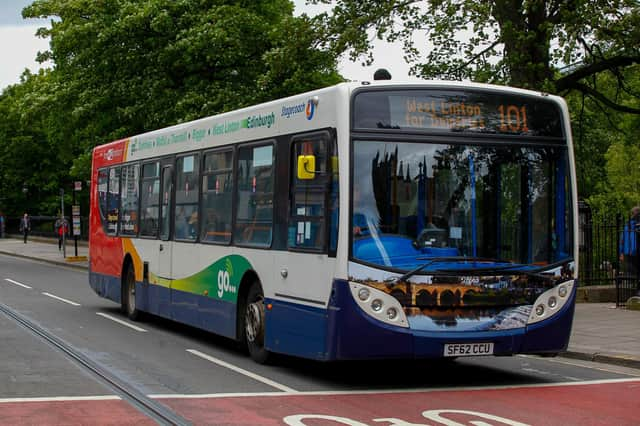Perth-based Stagecoach cheers efforts to get public back onto buses


The company said its local bus operations are running at around 17 per cent of levels for the same period in previous years.
However, it said the UK government has confirmed a £254 million “bus, tram and light rail restart programme”, which will provide operators in England outside London with payments for increased level of services, as social distancing impacts customer numbers.
Advertisement
Hide AdAdvertisement
Hide AdMartin Griffiths, chief executive of Stagecoach, said: “It will be some time before demand for our public transport services returns to pre-Covid levels and we are planning for a number of scenarios.”
The group said capacity on services has been “significantly reduced” as a result of physical distancing measures, but it is ready to restore operations to near pre-coronavirus levels, although transitional arrangements are needed to help operators provide comprehensive services.
It came as the company told investors it has significantly increased its available liquidity to deal with the impact of the virus. The company stressed that it has more than £800m available in cash or committed bank facilities.
Griffiths said: “We see a lasting effect of the Covid-19 pandemic on travel patterns with an acceleration in trends of increased working from home, shopping from home, telemedicine and home education.
“At the same time, we see positive drivers for our business from a renewed societal focus on health, wellbeing and the environment.”
He added: “Public transport can play a major role in a cleaner, greener and more resilient economy and society, tackling climate change with strong government action to reduce car use.”
Earlier this month, Stagecoach called for a joint strategy to secure vital public transport networks out of the Covid-19 lockdown, setting out a six-point plan for the “new normal”.
The firm identified short and long-term changes that will help reboot the economy and protect communities. It follows recent research by consultants Systra that suggests public transport use in Britain’s cities could be 20 per cent lower than pre-Covid-19 levels after lockdown.
Advertisement
Hide AdAdvertisement
Hide AdGriffiths said at the time: “Covid-19 has taken a terrible toll on many people’s lives across the UK and overseas. But among all the human tragedy, the pandemic has given us a window on what could be a positive future world – one with dramatically fewer cars on our roads, safer streets, cleaner air and less damage to our environment.”
A message from the Editor:
Thank you for reading this story on our website. While I have your attention, I also have an important request to make of you.
With the coronavirus lockdown having a major impact on many of our advertisers - and consequently the revenue we receive - we are more reliant than ever on you taking out a digital subscription.
Subscribe to scotsman.com and enjoy unlimited access to Scottish news and information online and on our app. With a digital subscription, you can read more than 5 articles, see fewer ads, enjoy faster load times, and get access to exclusive newsletters and content. Visit https://www.scotsman.com/subscriptions now to sign up.
Our journalism costs money and we rely on advertising, print and digital revenues to help to support them. By supporting us, we are able to support you in providing trusted, fact-checked content for this website.
Joy Yates
Editorial Director
Comments
Want to join the conversation? Please or to comment on this article.